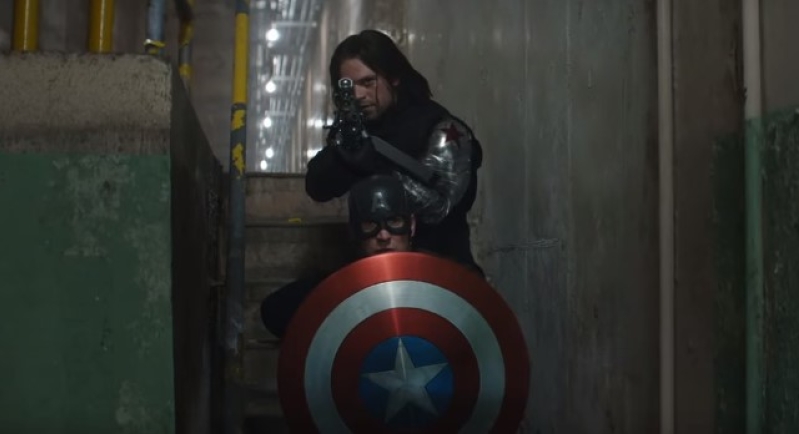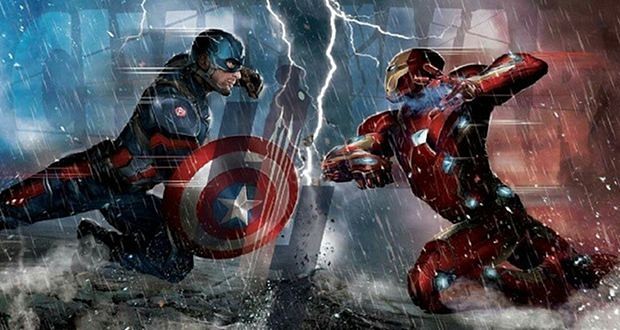Marvel's films have once again struck gold with Captain America: Civil War. Not only does the film continue with the Phase Three of the Marvel Cinematic Universe, but it creates a film with superior action as well as trying things not done before in a superhero film, and succeeding where DC is failing. Do not read our review of Captain America: Civil War unless you want some serious spoilers for not only this film but the direction that Marvel's Cinematic Universe is going.
The film opens in 1991, as we see that Bucky Barnes aka The Winter Soldier (Sebastian Stan) on what appears to be a routine mission. It is shown that it takes some random words to place him under his handler's control, and he is sent to find some weird blue potion. In all honesty, it took the film so long to go back to this plot point that I almost thought it would take another movie to deal with it.
That is one of the good and bad things about Marvel movies: you often don't get closure on certain plot points. It actually could have gone either way. For example, there was a villain briefly introduced in Captain's last solo film known as Crossbones (Frank Grillo), and the film opens with the team apprehending him before he can rob a lethal virus from "The Center for Infectious Diseases." Yes, it is an excuse to see the team in action, sort of like how James Bond and Indiana Jones films would often start with actions scenes that had little or nothing to do with the film's main plot.
The opening scene is all about the Avengers in Lagos, who consist of Black Widow (Scarlett Johansson), Falcon (Anthony Mackie), Scarlet Witch (Elizabeth Olsen), and field commander Captain America (Chris Evans). The mission appears a success, but when Crossbones goes suicide bomber on them, the only way to get him away from the crowd is to have the Scarlet Witch use her powers of telekinesis. Only when she tries to fling Crossbones high in the air, he ends up in an office building, and several people are killed.
Iron Man (Robert Downey Jr.) wasn't with them on this mission, but he is shown at MIT giving a speech to students. There is a weird scene with a hologram and his parents Howard (John Slattery) and Maria (Hope Davis) Stark. The scene feels forced, and what makes it even more strange is that there is a young Tony Stark there acting out the last time he saw his parents. I'm not certain how the effects team did this effect, but it looks really good.
Tony then meets a government worker named Miriam, played by veteran actress Alfre Woodard. She tells him his story about how her son died in Sovokvia, at the time of the end of Avengers: Age of Ultron.
The Avengers are then called back to headquarters, where they meet with Secretary of State Thaddeus Ross (William Hurt), proving that the 2008 film of The Incredible Hulk is actually within Marvel Cinematic Universe continuity, as this is the second time this character has been seen and played by the same actor. Ross tells the group that 179 countries have tried to sign a law that would recognize the Avengers as an agency under governmental scrutiny.
In other words, people who have powers and dress up in a uniform are accountable for their actions. Considering the billions of dollars and lives lost in New York in the first Avengers movie, this type of action from the United Nations seems a little late. The opening scene is an attempt to explain why it is being implemented so suddenly, but if the disaster in New York didn't make the UN want to legislated superheroes, why did the damage in Lagos sway them?
All the Avengers have to agree to the terms of the new laws. The problem is that Captain America feels that these laws could end up limiting his ability to do good. This action is punctuated by the death of Agent Peggy Carter (Hayley Atwell), who believed in standing one's ground. The Captain is then introduced to Agent Carter's niece Sharon Carter (Emily VanCamp) at Peggy's funeral, and it is quite clear that Captain America won't agree to the new law due to his principles.
Before the law is signed in Vienna, a bombing takes place at the event. All evidence points to The Winter Soldier as the prime suspect. Captain America knows that his old friend Bucky Barnes did not commit this crime, and so he goes to help The Winter Soldier, making himself a criminal. Unfortunately, the authorities show up to arrest Bucky at the same time, and Captain America then helps The Winter Soldier escape. It is here where the Black Panther (Chadwick Boseman) shows up to try and kill the Winter Soldier, because he believes that Bucky planted the bomb that killed T'Challa's (Black Panther's real name) father, T'Chaka. After a huge chase, all three superheroes are arrested.
In actuality, the Vienna bombing was committed by a man known as Zemo (Daniel Bruhl), and he manages to sneak into the facility holding The Winter Soldier and busting him out. Zemo is able to turn Bucky back to an antagonistic side with a few hypnotic keywords, but Captain America and the Falcon managed to re-capture him.
As it turns out, The Winter Soldier knows what Zemo is trying to do. Apparently, the blue serum that The Winter Soldier stole was able to create five more Winter Soldiers, who are apparently in storage and ready to be used. Zemo's plan is to apparently activate these evil soldiers and take down governments.

The only way to get to these evil soldiers is with an Avengers plane at a German airport, and this is when the big fight scene takes place in between the heroes. On Captain's side is The Winter Soldier, Hawkeye (Jeremy Renner), Scarlet Witch, Falcon, and Ant-Man (Paul Rudd), who was recruited as an ally.
On Iron Man's side is War Machine (Don Cheadle), Black Widow, Black Panther, The Vision, and Spider-Man (Tom Holland). I'll go ahead and discuss Spider-man's involvement in the story now, as there is a long scene where Tony recruits Peter Parker for his team. This is a well-written scene with Marissa Tomei as Aunt May, but the problem is that it interrupts the story. I suppose that it was necessary to establish Spider-Man for future projects, but it is weird to see Marvel's biggest hero reduced to what is essentially a side-character.
The scene at the airport is all the action that the viewer was promised in the trailer. It is quite a great superhero fight between all of the characters, and the best part was the perfect balance of humor and action. This fight is not only some of the best action you will see this year, but you will be laughing all the way and is completely worth more than your price for admission.
Not only that, it has some awesome moments like Ant-Man becoming Giant Man. Then there are legitimately dramatic moments like when War Machine is injured on duty and may not ever walk properly again.
I would say that the scene at the airport is so good that the film should have ended there, but it ends with Captain America and The Winter Soldier making a getaway to the place where the other winter soldiers are kept. At this point, a lull happens in the movie that is pardonable, because it is necessary to let the full-blown action cease so that Tony can learn that Zemo is the true enemy. The problem is there is a very expensive scene where Tony visits the losing side in prison, and this massive holding place is a big special effect that rises from the ocean. It feels a little bit unnecessary to the budget.
Eventually, Tony is willing to admit when he is wrong, and he goes to help Captain America. It is here that they meet Zemo, and he shows Tony a video with the Winter Soldier killing Tony's parents. This sets off Tony to fight with Captain and Bucky once again. This is where the emotional weight of the story hits as the action is more brutal than before, and it culminates with the separation of Captain America and Iron Man.

Captain America and Iron Man duels in the upcoming Captain America: Civil War.
Of course, it doesn't end there as it is revealed that Captain America has freed Scarlet Witch, Ant-Man, and Falcon from their cell, and sent an old clamshell phone to Tony via Fed Ex (with a delivery man played by Stan Lee in his obligatory cameo) just in case Iron Man needs the help.
So, that is the basic plot of Captain America: Civil War. Of course, there were two post-credit sequences, and the first showed The Winter Soldier in Wakanda, the Black Panther's country, about to be put in frozen storage. It's pretty much a set-up for a Black Panther solo film, in theaters on February 16, 2018. The other ending is a set-up for the Spider-Man Homecoming movie, due in theaters July 7, 2017.
Except for some of the nitpicks that I stated before in my plot with spoilers, Captain America: Civil War is a near-perfect Marvel film. When word of this film was being released with the subtitle of Civil War, fans of the comic books were skeptical. The Civil War is an event comic that took place a few years ago that involved the legislation of super-heroes. Since event comics bring in every character in the Marvel Universe, people wondered how much of Captain America would actually be in this film.
Fortunately, the bulk of the story does rest on the shoulders of Steve Rodgers (Captain America's real name). The story is really about accountability vs. freedom, and how Captain America has to stand his ground even though he will lose his friends in the process.
Ironically, DC really tried to discuss the theme of accountability in Batman V. Superman: Dawn of Justice, and it almost worked. At first, it seemed like the world was justifiable in its doubts of the all-powerful Superman and the vigilante actions of the Batman, but when it came time for Superman and Batman to actually fight, it felt forced. In the end, it was Lex Luthor who was pulling the strings for whatever twisted reasons he had, and somehow learning who Superman was off-screen and kidnapping his adopted mother.
What makes Captain America: Civil War work is it is a superhero story with no completely vile villain. Don't get me wrong, what Zemo was doing was wrong, but there was a reason for it. His family was killed in the Sokovia incident, and he knew that he could not stop the Avengers by sheer force alone. Instead, he turned them against each other. This is also what sets this film apart from other superhero films, is that the villain Zemo actually achieves his objectives.
The issue is that the audience can understand why each character is doing what they are doing, and so their motivations are clear and the conflict between them understandable. Even at the end, when Black Panther meets the man who kills his father, he does not allow Zemo to kill himself, though he could have.
So what does this mean for the Marvel Cinematic Universe? Well, if the government wants some accountability for their superheroes, they will want even more of it now as Captain America is now going above the law. This is one PR nightmare that Iron Man won't be able to spin, and this means that other Avengers films are going to inevitably focus on this schism that now exists in the Marvel world.






